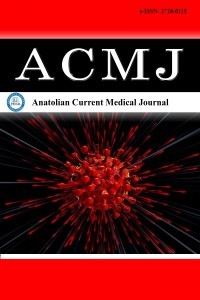An investigation of the diabetes health literacy level and compliance to the treatment in patients with diabetes in Turkey
An investigation of the diabetes health literacy level and compliance to the treatment in patients with diabetes in Turkey
chronic diseases, health literacy, diabetes mellitus compliance, treatment,
___
- WHO. Health literacy: The solid facts. 2013.
- Unıted Natıons Educatıonal Scientific and Cultural Organization, The global literacy challenge a profile of youth and adult literacy at themid-point of the united nations literacy decade 2003-2012.
- Kutner M,Greenberg E, Jin Y, Paulsen C, White S. The health literacy of America’s adults, National Assessment of Adult Literacy 2003.
- Tanrıöver M, Yıldırım H, Ready FND, Çakır B, Akalın E. Turkey Health Literacy Survey. Saglık-Sen Publications 2014.
- Okyay P, Abacıgil F. Türkiye sağlık okuryazarlığı ölçekleri güvenirlilik ve geçerlilik çalışması. T.C. Sağlık Bakanlığı 2016; 19-75.
- Bakan AB, Yıldız M. A study on determining the health literacy levels of individuals aged 21-64. Sağlık ve Toplum 2019; 29: 33-8.
- Hashempour L,Önal İ.Health and diabetes literacy, Master Thesis, The Case of Hacettepe University Hospitals, 2018.
- Durna Z. Kronik Hastalıklar ve Bakım, Nobel Tıp Kitapevleri, İstanbul, 2012.
- Satman I, Omer B,Tutuncu Y, et al. Twelve-year trends in the prevalence and risk factors of diabetes and prediabetes in Turkish adults. EJE 2013; 28: 169-80.
- Akalın E, Tanrıöver MD,Sayran F. Sürdürülebilir sağlık sistemi için kronik hastalık yönetiminde elektronik sağlık kayıtlarının rolü. TÜSİAD 40 2012; 29-52.
- Ho PM, Bryson CL, Rumsfeld JS. Medication adherence: Its importance in cardiovascular outcomes. Circulation 2009; 119: 3028-35.
- Wood B.Medication adherence, thereal problem when treating chronic conditions. US Pharmacist 2012; 37: 3-6.
- Jin J, Sklar GE, Oh VMS, Li SC. Factors affecting therapeutic compliance: A review from the patient’s perspective. Ther Clin Risk Manag 2008; 4: 269-86.
- Ishikawa H, Takeuchi T, Yano E. Measuring functional, communicative and critical health literacy among diabetic patients. Am Diabet Assoc 2008; 31: 874-9.
- Kartal A, Özsoy SA. Effect of planned diabetes education on health beliefs and metabolic control in type 2 diabetes patients. Journal of Hacettepe Universirty Faculty of Nursing 2014; 1: 1-5.
- Ağralı H, Akyar I.Turkish validation and reliability of health literacy scalefor diabetic patients. Acıbadem Üniversitesi Sağlık Bilimleri Derg 2018; 9: 314-21.
- Demirtas A, Akbayrak N. Development of an assessment scale for treatment compliance in type 2 diabetes mellitus in Turkish population: Psychometrice valuation. Int J Nurs Sci 2017; 4: 244-51.
- Sørensen K, Pelikan JM, Röthlin F. Health literacy in Europe: Comparative results of the Europe an health literacy survey (HLS-EU). Eur J Public Health 2015; 25: 1-6.
- Bal Özkaptan B, Kapucu S, Demirci İ. Relationship between adherence to treatment and acceptance of illness in patients with type 2 diabetes. Çukurova Üniversitesi Tıp Fakültesi Derg 2019; 44: 447-54.
- Kav S, Bulut Y, Karaaslan Eşer A. et al. Evaluation of the patient compliance in type 2 diabetes mellitus treatment. Ege Üniversitesi Hemşirelik Fakültesi Derg 2018; 34: 64-76.
- Krass I, Schieback P, Dhippayom T. Systematic review or meta-analysis adherence to diabetes medication: a systematic review. Diabet Med 2015; 32: 725-37.
- Kim S, Love F, Quistberg DA, Shea JA. Association of health literacy with self management behavior in patients with diabetes. Diabetes Care 2004; 27: 2980-2.
- Özonuk E, Yılmaz M. Relationship between health literacy and compliance with the treatment among individuals with type 2 diabetes mellitus. Hemşirelikte Eğitim ve Araştırma Derg 2019; 16: 96-103.
- Shokair FN. Pattern and determinants of compliance of diabetics to health care in Alexandria: A community based study. Bull Alex Fac Med 2010; 34: 200-10.
- Sweileh WM, Sa’ed HZ, Nab’a RJA. et al. Influence of patients’ disease knowledge and beliefs about medicines on medication adherence: Findings from a cross-sectional survey among patients with type 2 diabetes mellitus in Palestine. BMC Public Health 2014; 94: 2-7.
- Arslan E. Tip 2 Diabetes Mellituslu Hastaların Tedaviye Uyumlarını Etkileyen Faktörler, Tıpta uzmanlık tezi, Dicle Üniversitesi 2011.
- Lai AY, Ishikawa H, Kiuchi T, et al. Communicative and critical health literacy and self-management behaviors in end-stage renal disease patients with diabetes on hemodialysis. Patient Educat Counsel 2013; 91: 221-7.
- Osborn CY, Cavanaugh K, Wallston KA. Health literacy explains racial disparities in diabetes medication adherence. J Health Commun 2011 16: 268-78.
- Bauer AM, Parker MM, Schillinger D. Associations between antidepressant adherence and shared decision making, patient–provider trust, and communication among adults with diabetes: Diabetes study of northern California (DISTANCE). J Gen Intern Med 2014; 29: 1139-47.
- Thurston MM, Bourg CA, Phillips BB, Huston SA. Impact of health literacy level on aspects of medication nonadherence reported by underserved patients with type 2 diabetes. Diabetes Technology Therapeutics 2015; 17: 187-93.
- Yayın Aralığı: Yılda 4 Sayı
- Başlangıç: 2019
- Yayıncı: MediHealth Academy Yayıncılık
Gülnur TARHAN, İsmail CEYHAN, Rıza DURMAZ, Salih CESUR
Effectiveness of internal compression therapy in primary safen vein failure
Tuna ERTÜRK, Bülent Barış GÜVEN, Aysin ERSOY
Serum 25-hydroxy vitamin D, vitamin B12 and folic acid levels in myasthenic crisis
Exploring radiation safety knowledge among nurses
Berna UCAN, Hasibe Gökçe ÇINAR
The frequency of vitamin D deficiency in Ordu and its relationship with chronic diseases
Kubilay SARIKAYA, Çağri ŞENOCAK, Muhammed Arif İBİŞ, Fahri Erkan SADİOĞLU, Mehmet ÇİFTÇİ, Ömer Faruk BOZKURT
Is USG-guided aspiration more effective than physiotherapy in the treatment of Baker’s cyst?
Nurmuhammet TAŞ, Hülya UZKESER, Akın ERDAL
A large intra-abdominal leiomyoma with unusual urinary symptom: case report
